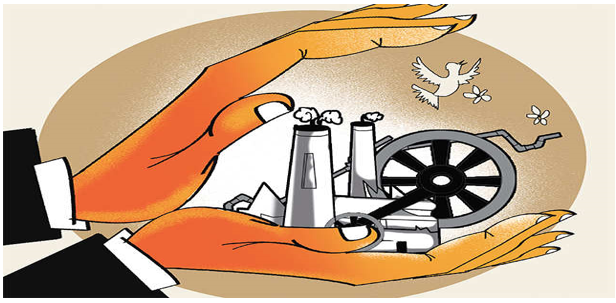Every financial year, various reports are published by International organisation (UNESCO, UN, and IPCC), National Organisation (Niti Aayog, Law commission) and even by private organisation like NGOs. These reports are crucial aspects in the analysis of performance in terms of both positive and negative mechanism. Reputed institutions like Niti Aayog publish reports from time to time and being the think tank of Government of India, these reports act as path provider to the government in power to either rectify the loopholes existing in the current policy or to formulate a progressive policy by keeping in mind the interest of all the key stakeholders (Civic Society).
There are various reports released by the Government of India as well as various institutions that are important for UPSC Examination. Although, these reports are more important for Mains and Interview perspective but, major key outcomes of the concerned report or points associated with report can be asked in prelims examination.
Some of original reports published by Niti Aayog like “National Monetization Pipeline” contain thousands of pages, most of which are not relevant from exams perspective. We at GS SCORE concise these reports from exam perspective and provide aspirants with only the relevant information necessary for the examination. This report series of GS SCORE can save aspirants’ time and energy which can be used to cover the mammoth syllabus of UPSC Examination. Some of the important reports include summary of India State of Forest Report, National Monetization Pipeline and so on. In this blog, GS Score will guide you how to extract relevant information from the reports like National Monetization Pipeline of NITI Aayog.
Analyse Previous Year Question Papers:
To understand the importance and pattern of asking questions from these reports, aspirants are highly advised to go through previous year question papers.
Solving previous years' question papers give aspirants not only the idea of question asked from the concerned topics but also help in understanding their own level of preparation. Self-assessment determine what strategy an individual should follow and how to continue with the preparation by identifying strengths and weaknesses. Solving previous years question paper will help aspirants in adopting best practicable preparation strategy by analysing all the segments and areas of asking questions.
|
Direct Question |
Statement Based Question |
|
Q. Which one of the following publish the ‘National Monetization Pipeline’ report? a) Reserve Bank of India b) Ministry of Home resource and Development c) NITI Aayog d) Ministry of housing and urban affairs |
Q. With reference to National Monetization Pipeline scheme, which of the following statements is/are correct?
Select the correct answer using the code given below; a) 1 only b) 2 only c) Both 1 and 2 d) Neither 1 nor 2 |
How/What/Why to Read Niti Aayog Report?
The decision of ‘what to learn’ and ‘how to learn’ plays a crucial role in the success of candidates in the UPSC Civil Services Examination. Covering reports like that of Niti Aayog require an aspirant to have questioning ability, so that aspirants can remember at -least crux of reports like these to utilise these points in not only solving prelims question but also answer questions of mains and Personality Test.
Take example of “National Monetization Pipeline” scheme. An aspirant should have the art of deeper analysis and questioning ability, like how this scheme can be helpful for India?
- Boosting the Economy: Development in infrastructure sector enhances level of economic activity which ultimately creates additional fiscal space by improving revenue base of the government, and ensures quality of expenditure focused on productive areas
- Investment Prospects: Creating new and upgrading existing infrastructure will be critical along with introducing a slew of reforms, in order to improve India’s global competitiveness.
- Prospects of Employment: Infrastructure development sector is labour intensive in nature. So it can lead to increase in employment opportunities prospects and thus, ultimately fuelling domestic demand.
Source to Cover Reports:
In recent years the importance of current affairs has proportionally increased with the analytical trend of questions as well as with the enhanced weightage of areas like environment, S&T and schemes /reports. There is no particular trend in which UPSC has asked questions from current events. Its unpredictable nature can be sensed from last year's paper where many direct questions from current events were picked.
Current Events covers a wide range of topics which overlaps with the CORE subjects like Geography, Polity, Economics, History and Dynamic subjects like environment, science and technology. Henceforth, it is hard to classify questions under a specific heading/topic. As far as preparation of report like “National Monetization Pipeline” published by NITI Aayog is concerned, aspirants should try to cover these reports from newspapers, Magazines, Niti Aayog website itself or form GS SCORE study material. One of the major benefits of covering such report from GS SCORE study material is that aspirants will not have to go through original thick volume of report. GS SCORE provides exhaustive coverage of such key topics in crisp relevant points. These, relevant key points can be remembered easily and can be utilised directly in the examination.
It may sound odd, but yes UPSC gives high priority to certain areas and dimension to ask questions. Being an IAS aspirant, its upto the individual how they can prioritise these key areas to get success. Aspirants, who face the issue of time management before the UPSC Civil Services Preliminary Exam, should definitely prioritize the key areas. Don’t go behind everything, focus on what is more significant from the exam perspective. Reports is a favourite question topic of the Union Public Service Commission. Every year, 1-2 questions appear in the exam from this area.
Related Articles




